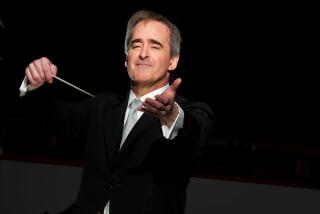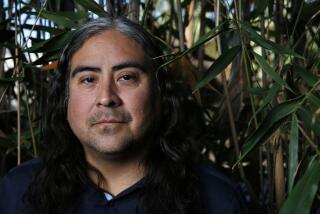Conlon Nancarrow; Composer for Piano
- Share via
Conlon Nancarrow, American-born, Mexican-citizen composer who wrote music for mechanical player pianos, has died at the age of 84.
Nancarrow, who moved to Mexico in 1940 and became a Mexican citizen in 1956, died Sunday at his home in Mexico City.
He rarely traveled to the United States but did accept a composer-in-residence position, along with modernist composer John Cage and two others, at the prestigious Cabrillo Music Festival in Aptos, Calif., in 1982.
Seven of Nancarrow’s complicated player-piano pieces were presented at that festival on recordings, with Times music writer Daniel Cariaga describing them as “busy music, noisy, dense and repetitive.” Three other Nancarrow compositions were performed by instrumentalists, winning Cariaga’s praise.
Also in 1982, Nancarrow won a “genius grant” of $300,000 from the John D. and Catherine T. MacArthur Foundation.
Nancarrow’s best-known works were “37 Studies for Player Piano (1950-68),” a unique group of compositions for the mechanical machine.
By using a specially designed punching mechanism, Nancarrow developed a technique of composing directly on the roll of the player piano. The technique allowed him to achieve complex rhythmic precision and sounds beyond the physical possibilities of human performance.
Reviewing a volume of Nancarrow’s studies in 1981, Times critic Lawrence Minton noted that the composer’s “unique art utilizes player pianos and hand-punched piano rolls to create a melange of jazz, Indian and African influences and Baroque counterpoint quite unplayable by human hands, primarily because of its breakneck velocity and mass.
“Though Nancarrow has freed himself from misinterpretation,” the reviewer wrote, “his music pays the price by sounding lifeless and mechanical, despite great variation in its terraced dynamics. Nevertheless, the pure novelty of sound and audacity of invention displayed here continue to fascinate.”
Nancarrow began composing work for classical instruments including “Toccata for Violin and Piano,” “Prelude for Piano” and “Blues for Piano,” all in 1935. His impatience with pianists unable to play the works properly led him to work with player pianos.
After his music gained popularity in the 1970s and 1980s, Nancarrow did accept some commissions to compose again for piano and chamber orchestras, including “Piece No. 2 for Small Orchestra” and “Three Canons for Ursula.”
Born in Texarkana, Ark., Nancarrow studied at the Cincinnati College-Conservatory of Music.
He joined the Abraham Lincoln Brigade to fight against Francisco Franco in Spain in 1936, and four years later left the United States when renewal of his passport was refused because of his outspoken Socialist views.
He is survived by his wife, Yoko Seguira, and son, David Makoto.
More to Read
The biggest entertainment stories
Get our big stories about Hollywood, film, television, music, arts, culture and more right in your inbox as soon as they publish.
You may occasionally receive promotional content from the Los Angeles Times.










